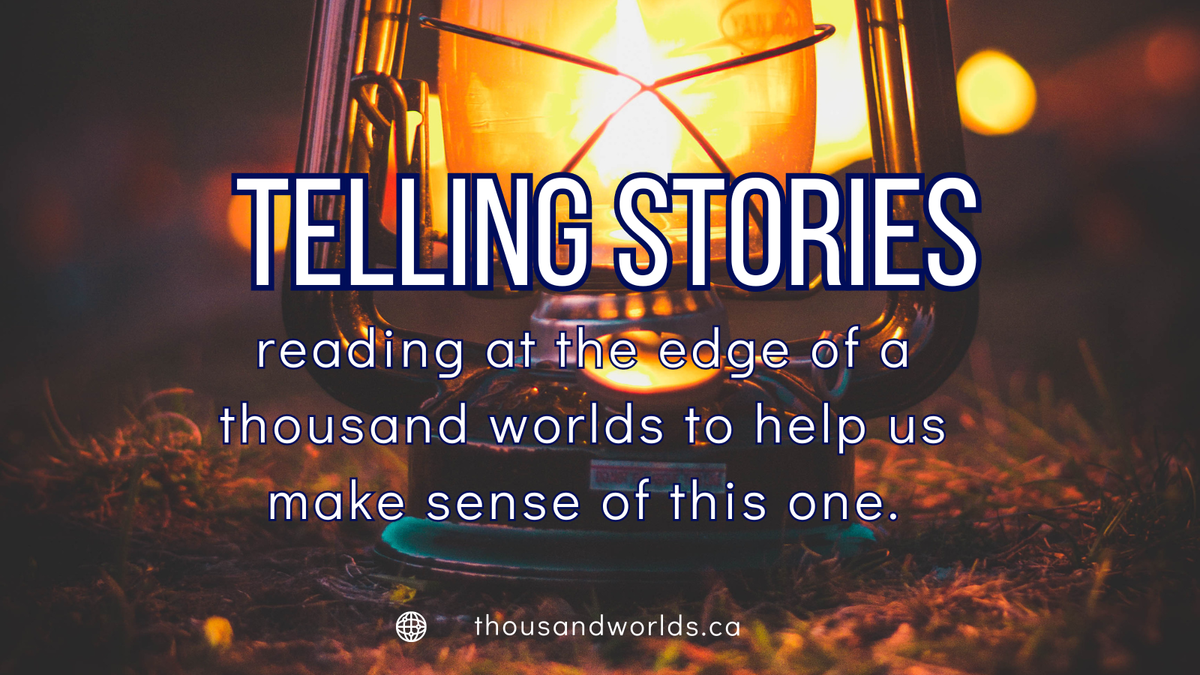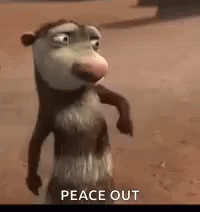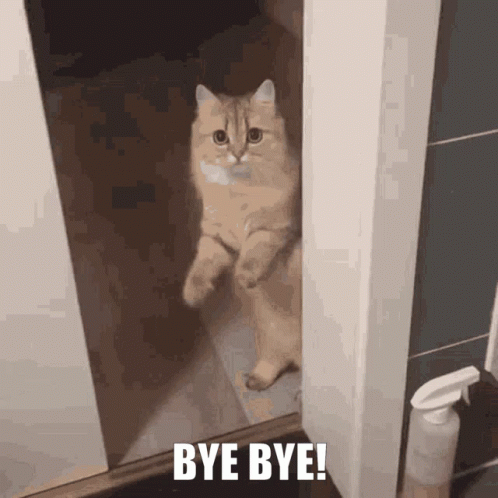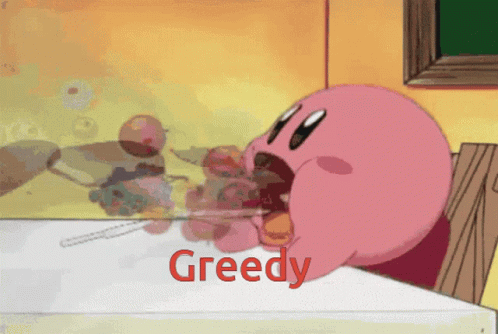Telling stories

reading at the edge of a thousand worlds, to help us make sense of this one
A few months ago I was invited to speak with a cohort of Indigenous students who were taking a summer course in AI development and I thought what? Everything I know about AI I learned from watching The Terminator like zhemnido intended. What on earth did I have to say to these kids who are definitely smarter than me about this? I agreed because the challenge sounded interesting but then as the date got closer my anxiety went up because, as I said, what on earth would I say to them? Then instead of worrying about what I am not, I started thinking about what I am. And what I am is a storyteller who firmly believes that the stories we tell can change the world.
So that's what I did.
There is a story about the deer abandoning the Anishinaabe that I come back to again and again. If you are unfamiliar with the story it talks about something that happened a very long time ago, when we weren't living that good life that our stories and ceremonies taught us to live. We weren't respecting the autonomy of others, it was just about ourselves and wanting hide for new clothes all the time, maybe updating the shelter so it didn't look like last year's. Throwing our weight around and trying to make Anishinaabe aki great again. I don't know, it was a long time ago and the world was different but maybe people don't change that much.
We eventually put things back together. Nothing like losing your main resource to force you to sit down and think about your priorities. I'm sure it didn't happen all at once, like "oh no the deer are gone we better get things right." Probably more like "wtf, well at least we've still got moose and beavers and all kinds of other things to eat" until they started peaceing out too. I don't know that they did, but it would make sense if they took one look at the new system and got the heck out one by one or all at once.

So eventually we did sit our hungry selves down in last year's shelter and after we finished feeling sorry for ourselves we started paying attention to our stories, started seeing ourselves not as the kings of creation but as its most pitiful and most needy subjects. And after that long hungry winter when it became spring we sent out runners to try and find the deer so we could make things right. I have to believe that they had been watching us and knew it would be safe to be seen again.
Like I said, we put things back together. We listened to the harms that had been done, grieved the things we simply couldn't fix, because not all harms can be made right, and the deer agreed to come back with the new agreements in place.
And for a while things were ok.
Until they weren't.
(this is the part I made up)
Long after the deer and the Anishinaabe put everything back together things went sideways again. Things always do. We get things right until we don’t. This time the Anishinaabe decided to make their own social media platform. Lacking imagination, and still laughing about that movie, they called it Smoke Signals. They promised it would be different and for a while it was. Deer came. Beavers came. Even the birds abandoned their old app after some emerald mine nepo baby bought their platform and took them off the logo. Representation matters.
The Anishinaabe really did want Smoke Signals to be different and they remembered the old stories about how they had treated the deer badly so they invited the deer onto various committees, and some of the other animals too because they remembered that they weren’t much nicer to the other animals after the deer left. But none of them had fingers or thumbs so it didn’t make any sense to let them do the coding which needs fast typing skills and speech to text just doesn’t work for coding. So the deer and the beavers just came to meetings and the Anishinaabe did listen. When they weren’t anxious about coding problems or how fast the platform was growing despite limiting the invite codes. Ok they got distracted during meetings and pretty soon they started making excuses about how they couldn’t attend so they put the deer in charge of the committees and then a couple of Anishinaabe would meet with a couple of the deer and that was good enough right? They got feedback which they meant to pay attention to, except there was a really big problem with one of the servers and it happened on the weekend and it needed all hands on deck. which meant hands so the deer and the beavers didn’t really have anything to do but look at all the reports stacking up that nobody was reading.
Then one day a deer noticed somebody with the handle “EatVenison0069” and when she did a search she saw a lot of people with similar handles and it was a little scary because she saw that those accounts were following mostly deer and saying things that sounded threatening so she reported it to the committee who put it into a report but then there was another crisis and that report didn’t get read either.
And that became a crisis
because Waawaashkeshikwe was on the main committee and since she’s Deer Woman and can shape shift she could have been involved with the coding but the Anishinaabe must have forgotten who she was because she never got invited. You don’t mess with Deer Woman, not unless you are bored and want a Really Big Crisis and also some bad PR and maybe don’t mind if a few heads literally roll or maybe just get vapourized because that’s what happened. She skipped right past the committee and the coding team and went straight to her own very big platform, I mean of course everybody follows Deer Woman, and she told everybody what was going on. How the coders didn’t really listen and skipped meetings and let a whole bunch of people with the kind of handles you’d expect from the other platforms come here and harass the deer and the beavers and others who were told that Smoke Signals would be different and this just goes to show that the Anishinaabe had most certainly not learned their lesson.
The Anishinaabe panicked, howah. They remembered how bad it was the last time the deer abandoned them and after a long time of panicking their PR team said that they had to say something so they said they were sorry but they didn’t put “EatVenison” in their filter for names that are not approved and their moderating team is working hard but they missed those other complaints about the things that were being said but they were on it now.
And the deer said we don’t believe you and they left again.

The social media platform Bluesky did have a situation like this, and after some anti-Blackness went unchecked a lot of people did leave. Not enough to tank it but enough Black and Indigenous people did leave or just decided that it wasn’t that different after all because representation might matter, but representation is not inclusion. You can have people at the table and on committees but if they aren’t in the places where decisions are being made, if they aren’t heard or represented in the policies and practices that are being developed to guide the work then things will slip through and despite the best intentions,
we’ll just replicate the very systems we’re trying to avoid.
How can we not?
We have an obligation to our communities, to do our work in a way that keeps us in contact with and accountable to our communities, so that our successes and harms are not invisible. it’s often too easy to harm people we don’t know, to push that button or change the direction of that trolly and accrue benefits in ways that we don’t see the costs. but if we keep our work rooted in our communities, if the things we develop are actually for our communities then the possible harms become very tangible. It is not enough that our communities are represented in the data, but that they have control over the story being told with and about our data.
Data is just isolated parts of our lives, things people can know about us. It doesn't mean anything until it becomes part of a story.
The story told about our data depends on a lot of things. It depends on the assumptions we bring to it and other stories we have heard, most of which come from the dominating culture. That's the magic of listening to all kinds of other stories, it opens us up to other possibilities.
Dr. Keolu Fox is a Kanaka ʻŌiwi geneticist and bio ethicist, he’s part of the Indigenous Futures Institute at the University of California San Diego and he talked with my podcast cohost and I about the story told about a so-called thrifty gene. It’s supposed to explain why Pacific Islander men are so heavy: long pacific journeys meant little food so they developed a gene that allowed them to extract maximum value but when they aren’t living that way the gene makes them fat. Except that’s not true. The gene, CRE BRF, is primarily found in the Pacific amongst Hawaiians, the Chamorro, and Guam. And it's actually associated with muscle density. And there was a follow up study of Polynesian rugby players with Polynesian or Maori ancestry who have a higher frequency of this mutation. Fox says it's more like a tall, dark and handsome mutation that has to do with BMI and athletic performance than it is like a thrifty mutation that predisposes them to obesity.
Turns out that obesity among Pacific Islanders is actually related to colonialism and a change in diet and lifestyle, the lack of access to traditional foods and activities. Just like with us. So they have this data but depending on how you interpret it, what other questions you ask, you can either situate the problem in us or in the things that impact us. We should be studying the genetic impact of colonialism. Maybe find out if greed and extractive attitudes are genetically linked.

The Anishinaabe talk about seven generations, which doesn’t just mean seven generations forward. It means that each of us is at the center of seven generations, and our kids are at the centre of seven generations and we exist in webs of connections spanning seven generations. Anikioobijigan means great grandparent and great grand child. Same word. It is connected to words about connection and linkages. We go into the future because we are rooted in the past. That’s what gives us our strong grounding. Keeps us remembering who we are.
James Vukelich of "Ojibwe Word of the Day" fame wrote a book called Seven Generations and Seven Grandfather Teachings in which he teaches us about the seven teachings through the words themselves, because that is the language of the teachings and the english words are just substitutes for the real ones. These words can help guide us to live that good life, mino bimaadizowin, so we avoid being abandoned by those we depend on.
Debwewin | Truth. We speak from our heart. we tell the truth that we know
Dabasendizowin | Humility. We remember that we are nothing without our relatives, human and other than human.
Manaaji’idiwin | Respect. We go easy on people. This is not about respect for authority, "respect the position if not the person" (yuck). This is acknowledgement of relationship. gratitude. Go easy on people, but be ruthless with the systems.
Zaagi’idiwin | Love. James tells the story of the suckerfish who sacrificed themselves so that the people could eat. We ask for, and show, compassion.
Zoongide’ewin | Courage. To have a strong heart, to choose relationship over conflict. the strength of heart to seek the best for everyone, not sacrifice anyone for some greater good
Gwayakwaadiziwin | Honesty. It is not enough to simply be truthful. our words have to align with our actions, we seek balance.
Nibwaakaawin | Wisdom/intelligence. To lead a life with vision. Imagination, creativity. See the path ahead. Seven generations.
Mino bimaadizawin. a good life. A life lived in truth, with humility and respect for others. Love that shows compassion and chooses relationship over conflict. To align our actions with our truth and let vision guide us. Vision that reaches forward seven generations, but remembers that we are nested within seven generations. That everything we do is, in some way, an act of devotion to our ancestors and an obligation to prepare a good world for our descendants. This is what the Anishinaabe forgot in the first story, and it's what they failed to remember when they got full of themselves in their new tech and the deer abandoned them again.
The CLEAR Lab founded by Dr. Max Liboiron (Métis) is founded on the principle that being a scientist means taking sides which means that they think carefully about the story the CLEAR Lab tells about the data they collect. They think carefully about how that information is collected. Marine biologist Mary O’Brien (unmarked) says that, “once you’re a scientist, which means as soon as you systematically ask questions about the universe, you take a political side” (1993: 706). The questions you ask, the way that you ask them, as the website says,
creating knowledge is a political act where some values and interests are reproduced and others are not.
There is no way around this. We can only be more or less intentional in these choices and if we are not intentional about the world we want to build, the stories we want to tell, then we'll just keep replicating the systems we've got because how can we not? This is what I really wanted to drive home for these students. The importance of our stories in keeping us grounded and helping us choose sides.
The CLEAR Lab has developed specific policies and protocols for how knowledge is developed, what community consultation looks like, the reality of ongoing consent as it relates to the collection and use of data. Colonialism is about taking land, but it is about more than that. It is, as Glen Coulthard (Yellowknives Dene) about relations of domination. Unless we actively work against it the world we live in rewards those relations of domination. The things we know, or think we know, about each other become the stories that shape how we write policy or teach history or negotiate contracts.
That's all great if you're a scientist or academic, whatever kind of knowledge you are developing, these principles are important if you want to avoid being abandoned by those you are relying on. But what if you're not a scientist? I mean, sure I was talking to a group of students in a summer study of AI Development, but they were going to be working in all kinds of different fields, writing or using AI to tell all kinds of stories about the data they collect. How do these principles apply to you in whatever work you're doing? I don't know, you'll have to figure that out for yourself. But I'll tell you how I've applied them to my own work.
It is about how you arrive and build relationship with the land you are on. And then once you’re there, it’s also about how you receive others.
Natalie Diaz (Mojave/Akimel O’odham)
We Are The Middle Of Forever
We have to stay rooted in place.
no matter where that place is
One criticism of Becoming Kin that I took seriously was that it was not more firmly rooted in Anishinaabe aki. I understood that was a publishing decision, I have a US publisher and so the emphasis is on US things, right down to “the US and Canada” rather than “Canada and the US.” The book I'm working on right now is more consciously rooted in Anishinaabe aki, it is not an “Indigenous” book. It is my book, rooted in me and my relatives, my community, and our location. Everything from the spelling to the stories I tell root this book in the land and relations where I am rooted.
The people I cite are also rooted through their own land relations. Everybody gets introduced the first time I mention them according to how they introduce themselves so that we know their context and so that we start thinking about how their relationship to that place begins to shape the ideas they share. Where are you from? What is your relationship with that place? This is how we started our circle when I spoke with those students.
We have to stay rooted in community.
And after we located everybody in their place, I asked them about their relationship with their community. How does that relationship shape the work they are currently doing, hope to do. Then, how do you see the work you are doing shaping your community, the place where you are rooted. That's the humilty that Vukelich has us thinking about, not that we should diminish ourselves as being worthless. That's just self-centering nonsense. Honestly, I rarely meet people as self-absorbed as the ones who insist they aren't worth anything. No, in the Anishinaabe sense it is a reminder that we are nothing without our community. That we must not forget who and what has shaped us. That is what the Anishinaabe in the stories about the deer kept forgetting. They thought committes were enough, but they aren't. Inclusion has to be meaningful and respectful to be worth anything. Otherwise we're just using them to promote our own agenda. Which is pretty gross really.
Much of my next book comes from conversations I had with others, mostly on podcasts. So I've been sending the manuscript around to the people whose conversations I cite, making sure that I'm honouring their work and their words. Making sure I am introducing them the way they want to be introduced. Footnotes and citations are another way to root my thoughts in the places and people they emerged from, to show gratitude for the things I have learned.
The Anishinaabe forgot about reciprocity and respect, and it cost them. But that's our story, about us and the things that we need to learn again and again. I tell Anishinaabe stories because that's who I am, but I'm sure you have your own stories about times when your people went off the rails and lost the things that mattered. Find those stories, and listen for what they are telling you about how to get back on track. Listen for what they are telling you about who you have left behind, or forgotten about or were willing to sacrifice so that you could have what you have. Listen to other stories, the ones told by those who have been forgotten or sacrificed. They'll open up a world for you that you hadn't seen, but don't forget your own place. If I may be real for a moment, clear folk tend to see themselves as the victims in all the stories, maybe because deep down y'all know that you'll never be royals no matter how much you cheerlead for them. But it's still your systen, so change it up a little, especially if you are listening to the stories of those who have experienced the harms of colonialism. How you hear these stories is as important as the act of hearing them.
Then do something about it.
Thanks for reading. And big miigweches to paid subscribers like my new bestie Hannah. Being a paid subscriber is awesome, it helps me get to conferences and buy the books that power this show, but just sharing this email with friends or posting about it on social media helps too!
I am hard at work at book #2 which is about a series of podcast conversations I had a couple of years ago. You can listen to them, most of them were released on podcast format, or just watch the twitch stream that is still linked. It's due to be released in fall 2025 so watch for more details about THAT as they come available. All that being said, thank you so much for your patience and I hope to be publishing here more frequently now that the heavy lifting phase is complete and we're into edits and revisions. There's a big pile of books stacked up in my "write about this" pile.
If you want to come and see/hear me there are two great opportunities coming up!
August 30-September 2
I'll be in Chicago at Socialism 2024 again where I'll be on a panel with Fawn Pochel and Tara Houska, a pair of badass Anishinaabekwe, and we'll be talking about Confronting the Peaceful Indian as Essential to Building Solidarity: examining and working against the invasiveness of the Peaceful Indian trope that sees us as helpless victims in need of a white saviour. Too much socialism is just a kinder and more inclusive settler colonialism. No thankyou.
September 22-24
Nevertheless She Preached is a conference in Austin, Texas that is "a radical gathering for faith leaders, activists, creatives, and spiritual entrepreneurs" I spoke at last year. There is a virtual option available this year and the theme is "Liberate: Imagining a Faith Decolonized" with a specific eye towards Palestine and Palestinian liberation. Use the code NSPKrawec to get 10% off on in person or virtual tickets!

And don't forget to join up with the Nii'kinaaganaa Foundation. Every month we collect funds from people living on Indigenous land and redistribute them to Indigenous people and organzers. You can find out more information on the website. Donate via Patreon or PayPal!
